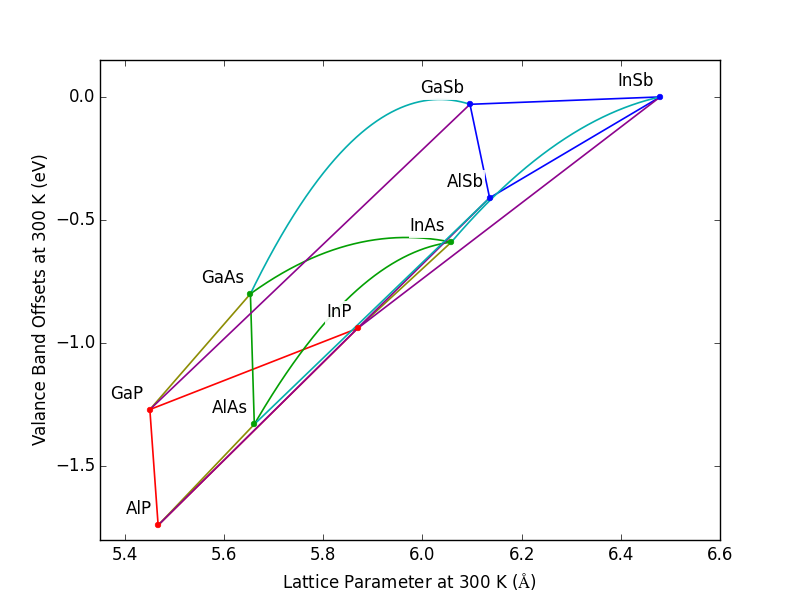Plot Valance Band Offset vs Lattice Constant¶
Source:
#
# Copyright (c) 2013-2014, Scott J Maddox
#
# This file is part of openbandparams.
#
# openbandparams is free software: you can redistribute it and/or modify
# it under the terms of the GNU Affero General Public License as published
# by the Free Software Foundation, either version 3 of the License, or
# (at your option) any later version.
#
# openbandparams is distributed in the hope that it will be useful,
# but WITHOUT ANY WARRANTY; without even the implied warranty of
# MERCHANTABILITY or FITNESS FOR A PARTICULAR PURPOSE. See the
# GNU Affero General Public License for more details.
#
# You should have received a copy of the GNU Affero General Public License
# along with openbandparams. If not, see <http://www.gnu.org/licenses/>.
#
#############################################################################
# Make sure we import the local openbandparams version
import os
import sys
sys.path.insert(0,
os.path.abspath(os.path.join(os.path.dirname(__file__), '../..')))
from openbandparams import *
import matplotlib.pyplot as plt
import numpy
T = 300
T_lattice = 300
# initialize the plot
fig = plt.figure()
ax = fig.add_subplot(111)
plt.xlabel('Lattice Parameter at %g K ($\AA$)' % T_lattice)
plt.ylabel('Valance Band Offsets at %g K (eV)' % T)
# Define colors
red = '#FE0303'
green = '#04A004'
blue = '#0404FF'
red_green = '#8D8D04'
red_blue = '#8D048D'
green_blue = '#04AEAE'
# list the binaries
phosphide_binaries = [AlP, GaP, InP] # red
arsenide_binaries = [AlAs, GaAs, InAs] # green
antimonide_binaries = [AlSb, GaSb, InSb] # blue
# list the ternaries
phosphide_ternaries = [AlGaP, AlInP, GaInP] # red
arsenide_ternaries = [AlGaAs, AlInAs, GaInAs] # green
antimonide_ternaries = [AlGaSb, AlInSb, GaInSb] # blue
phosphide_arsenide_ternaries = [AlPAs, GaPAs, InPAs] # red + green
phosphide_antimonide_ternaries = [AlPSb, GaPSb, InPSb] # red + blue
arsenide_antimonide_ternaries = [AlAsSb, GaAsSb, InAsSb] # green + blue
# plot the ternaries
fractions = numpy.linspace(0, 1, 1000)
for ternaries, color in [(phosphide_ternaries, red),
(arsenide_ternaries, green),
(antimonide_ternaries, blue),
(phosphide_arsenide_ternaries, red_green),
(phosphide_antimonide_ternaries, red_blue),
(arsenide_antimonide_ternaries, green_blue)]:
for ternary in ternaries:
ax.plot([ternary.a(x=f, T=T_lattice) for f in fractions],
[ternary.VBO(x=f, T=T) for f in fractions],
color=color,
linewidth=1.2)
# plot and label the binaries
x = []
y = []
label = []
for binaries, color in [(phosphide_binaries, red),
(arsenide_binaries, green),
(antimonide_binaries, blue)]:
ax.plot([b.a(T=T_lattice) for b in binaries],
[b.VBO(T=T) for b in binaries],
color=color,
linestyle=' ',
marker='o',
markersize=4,
markeredgecolor=color)
x.extend([b.a(T=T_lattice) for b in binaries])
y.extend([b.VBO(T=T) for b in binaries])
label.extend([b.name for b in binaries])
for x, y, label in zip(x, y, label):
ax.annotate(label, xy=(x, y), xytext=(-5, 5), ha='right', va='bottom',
bbox=dict(linewidth=0, fc='white', alpha=0.9),
textcoords='offset points')
plt.xlim(5.35, 6.6)
plt.ylim(-1.8, 0.15)
if __name__ == '__main__':
import sys
if len(sys.argv) > 1:
output_filename = sys.argv[1]
plt.savefig(output_filename)
else:
plt.show()
Result:
